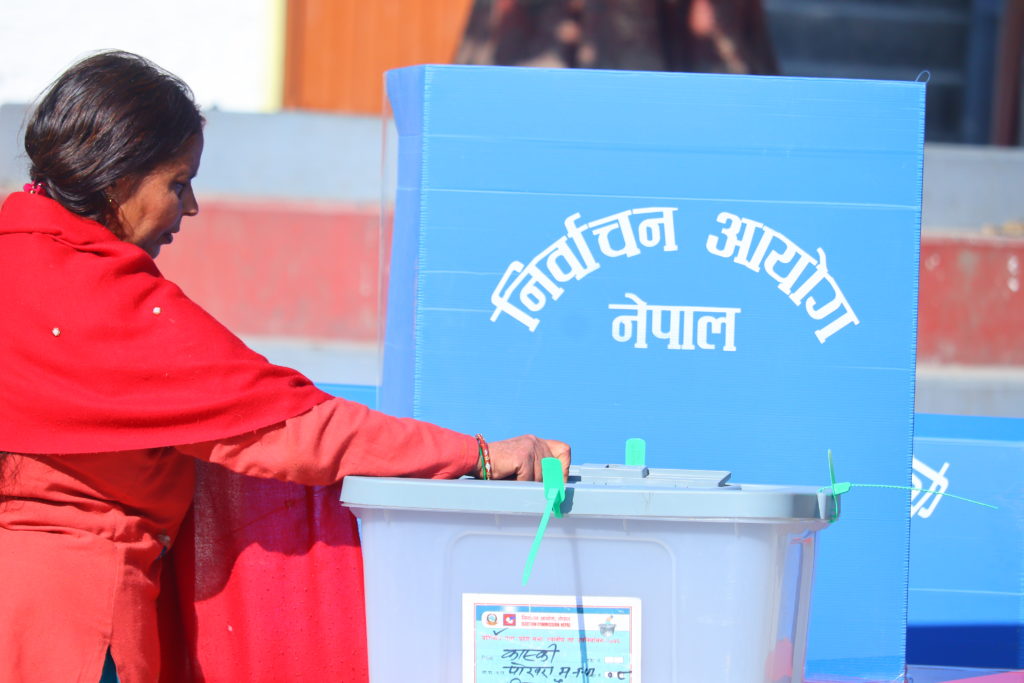What to expect from Nov 20 elections?

This perhaps could be the reason, among others, why interest toward ‘electoral democracy’ is declining not only in the emerging but also in the so-called consolidated democracies of the west. In the context of Nepal, there certainly are problems but that does not mean that one should lose hope in democracy as there are always rooms for improvements which, yet again, largely happens from the elections.
Overall, democracy is a work in progress project and is certainly a better system than many of those available in the market. Still, one may ask a question as to what extent upcoming elections can be a step towards ‘work in progress’. Nothing can be said now, everything hinges on how the electoral results pan out. Yet the way ‘tickets’ were distributed by the political parties and alliances were formed—there is little scope for the improvements. Once again, political parties have filled the same candidates who have been tested in Nepali politics on more than one occasion. In fact, if we look at the list of nominees chosen to contest election, it looks as if parliamentarians have become permanent (same faces) whereas the ‘legislative assembly’ is temporary in nature as its term expires in every five years and only gets its residents through elections after that. The new political parties and independent candidates—who are only promising goodies and change the political demography of politicians. The underlying situation and the political economy of the election, however, is not really conducive for them to be elected at least for two reasons: first, as hinted, the political ecosystem is entirely captured by those who can be termed as the resident political parties, and it certainly will be difficult for them to dismantle that ecosystem under the current circumstances. Second, the so called ‘independent’ candidates do not necessarily have any clear policies and programmes. On the contrary, most of them are the product of ‘neoliberal populism’ which does not really work here. For good or bad reasons, they have largely thrived on the inaction of the ‘resident’ political parties. Whatever the electoral outcome is, if the political culture does not change Nepal, for sure, will not have a comfortable journey towards democratic consolidation process. The fall of Nepal Communist Party’s two-third majority government earlier has forced people to conclude that most of the time it’s the internal factors which are creating more problems than the external ones. The NCP which, at hindsight, promised many things, splintered in many parts and the Supreme Court of the country have had to intervene to settle the political dust unfurled which certainly is not good not only from the perspective of separation of power but also the ‘sovereigns—the people—were insulted time and again. Questions may arise—who the decision makers are in a democracy. There are equal chances that Nepal’s upcoming parliament will also meet the same fate as the earlier one did. Such conclusions could only be made based on the way political parties have selected candidates to contest the election. If elected, most of them will have nothing to do with democracy. In contrast, while some of them are careerist political leaders, others wanted to enhance their own business and networks. There certainly are some who might have democratic impulse, but they will be overwhelmed by others. Sad as it may be, we have developed democracy into a political system that offers multiple benefits to those who are associated with the process in more than one way but for those who are out of the ring—it’s not really anything. The second point in that regard is the lack of civic political culture. And, of course, the external factors—which certainly are going to be there as they were in the past—could well be taken as the third factor. Yet, so far so good, despite all these, good part of Nepal’s journey towards democratization process is such that, at least, elections are being held even at least to come into the power then and now—although they may not have been able to bring about substantial changes into the life of people—which certainly provides relief to the people. If otherwise, means were taken to come into politics, it certainly would have been disastrous. The author writes commentaries on domestic politics and international affairs. [email protected]; Twitter: @Cdbhatta
related news
Lumpy skin disease and its economic impact
July 10, 2023, 6:17 p.m.
Silver lining for Pancheshwar project
July 10, 2023, 6:05 p.m.
Private sector’s boost may spur economic rebounding
July 7, 2023, 4:47 p.m.
Three-way competition and Nepal
July 5, 2023, 4:28 p.m.
The unaccounted costs of a self-focused mindset
July 5, 2023, 1:49 p.m.
Nepal should adopt a multi-alignment policy
July 4, 2023, 11:36 p.m.
White man’s burden, brahminism and racial superiority
July 4, 2023, 6:05 p.m.
Is ‘left unity’ on the card?
July 4, 2023, 2:44 p.m.










Comments